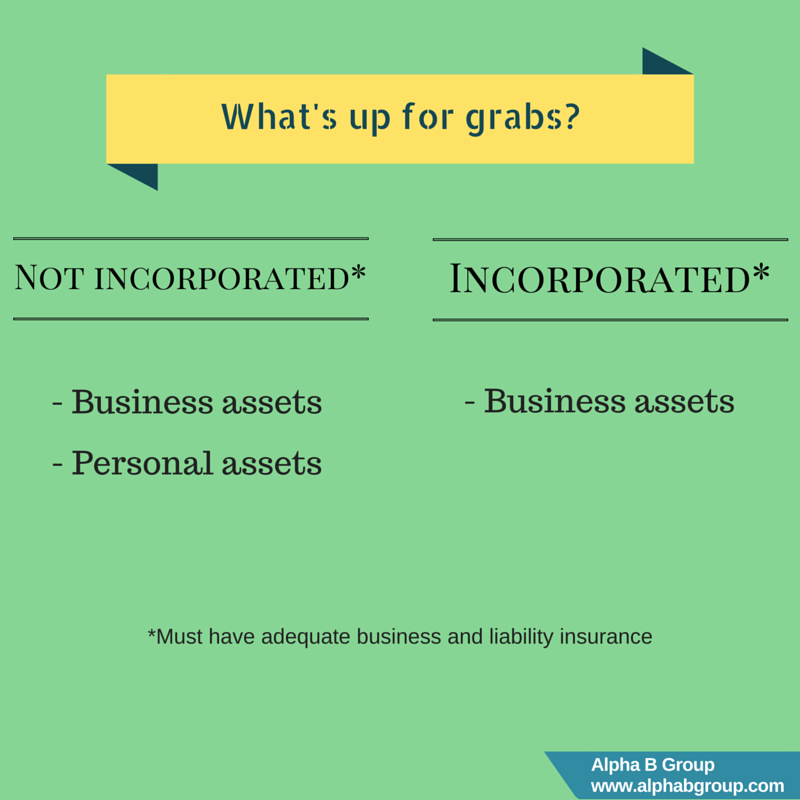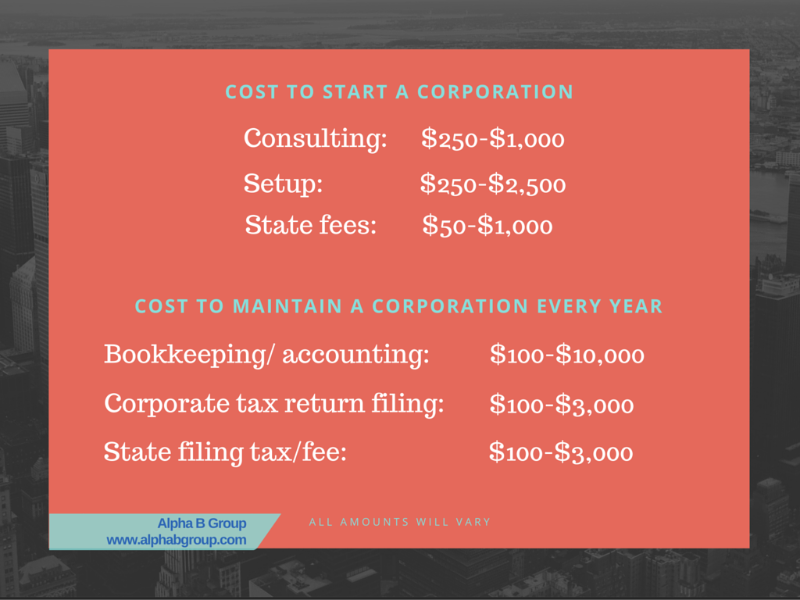|
As a business owner, there are so many choices and decisions that must be made for the business - marketing, budgeting, hiring, etc. One of those decisions is: should I incorporate my business? With all the various choices and reasons, it can be a daunting task to learn and understand it completely. Lawyers, accountants, and neighbors all have their opinions on which is best - and this makes everything so much more confusing. I'll explain it from a business owner's perspective on why incorporating would be a good idea or if it's unnecessary. Depending on the situation, sometimes incorporating isn't the best idea because it's unnecessary for the type of business or the cost effectiveness might not be worth it.
First! I want to put this disclaimer - this is not legal or accounting advice. It's just my opinion as a business owner.
So as a business owner there are three things to consider:
First thing to consider is if there is a high chance of liability in my industry. Liability is if something goes wrong with the business, can anyone sue the business or file any type of legal claim/lawsuit? "Liability protection" is what helps guard certain things from legal claims/lawsuits. For a business owner, what needs to be understood is if anyone were to sue the business, what can they take? It's broken down into two different types of assets - business assets vs. personal assets. Business assets are things owned by the business such as equipment, computers, bank accounts, etc that is owned and used by the business. Personal assets are things owned by individuals (not associated to the business) such as personal car, house they live in, furniture, retirement accounts, personal bank accounts, stocks in brokerage accounts, etc. If anyone were to sue the business, what can be "up for grabs?" If you are NOT incorporated, it's both business and personal assets. If you ARE incorporated, then it would only be the business assets.
For example, if I'm a mechanic and NOT incorporated - I forgot to tighten up the lug nuts on the tires, then when the customer drives on the freeway a whole tire comes out causing a 10 car pile-up. If everyone who got injured and property damage from that accident files a lawsuit against my mechanic shop, they would first come after the business assets - work computer, car tools/equipment, etc. If that wasn't enough to cover the total cost to pay the lawsuit, then my personal items may also be "up for grabs" - house, car, savings. If I was incorporated, theoretically, it should only be my work items. All my personal items should be safe from the lawsuit.
KEEP IN MIND - incorporating is nothing like insurance coverage. Lawyers are probably freaking out as they read this because I haven't brought up insurance yet. So I will say it now to satisfy those attorneys' gripe, YOU STILL MUST HAVE BUSINESS AND LIABILITY INSURANCE NO MATTER WHAT! I also must note that there are more rules to follow as a corporation to make sure personal assets are protected against legal claims on the business. Talk to an an attorney about this. So as a business owner, I must weigh what are the chances of me getting sued? Would I get sued if I have a food truck business where a group of people got really sick? Would I get sued if I was a daycare provider and one of the kids got badly hurt? Different industries have different levels of liability. Someone that does general gardening will not have a high chance of getting sued like a doctor's office. There's also more to consider when weighing the liability. Most business owners think about customers suing them but are not aware of a possibility that it could be someone other than the customers filing a lawsuit. One example I heard from an actual attorney: a small insurance office with one owner and one secretary. The secretary does general office work such as taking phone calls and filing. One day, the boss needed important documents copied right away but the copier was out of toner. So he urged the secretary to get this done immediately. The secretary stopped everything she was doing and went to go change the toner as the boss demanded. Simple task. She then saw toner powder inside the copier so she blew into it to help clear it out. What happened was that the toner powder flew back into her face and into her eyes. She was rushed to the emergency room. What if she wanted to sue the owner for this? Would the owner be liable and possibly lose everything? Yes, it's very possible. There are 6 industries where being incorporated may be a good idea for liability protection:
Not only does the industry matter but also two other factors:
Partnering: When starting a business, it's very common to want to start it with someone else. For the most part partnering up with someone is fun and beneficial at the same time. Well, too many situation can come about where a partner can be so much more costly. If my friend and I start a business together, we're both responsible for each other's actions. If I mess up, he's just as responsible for it as I am - and vise versa. Too many stories where a partner cheated a client without others knowing. The client comes back and sues the entire business. Too many stories where a partner took out a loan using the business name and forged documents to leave the other partner responsible for the debt. Would I want to take the heat for someone else's action? I might be ok with losing the business but not the home I live in. Employees. Having employees is vital to a growing business. They are assets but also potential liabilities. If my employee does something wrong in the office, I, as the business owner, am responsible for it. If my employee gets hurt because she dropped the 5 gallon water jug on her foot, I can be responsible for that. If my employee is going through tough times at home and ends up punching a rude customer, I'm responsible for that. If my employee sends out confidential information to scammers, I'm responsible for that (this actually happened to Seagate this year). So many things can happen with employees, most of the time it probably won't but should I risk possibly losing my family's home? Many business owners may think, why do I need to incorporate if I already have business liability insurance? Or if I'm a doctor, why would I need to incorporate if I have malpractice insurance? For me, I'm not very confident in insurance companies to really take care of me when something goes wrong. This just allows one more barrier just in case. What are the additional costs of being a corporation and how much will I save in taxes? As a business owner, I must be aware of additional cost but also potential savings. I must evaluate if having a corporation would really be cost effective. What I mean by being cost effective is how much more does it cost to be a corporation but how much less taxes will I pay? If I save more in taxes than it cost to maintain the corporation, then being a corporation is a no-brainer. For example, if my yearly cost to maintain a corporation is $5,500 but I save $10,000 in taxes, it mean's I'm positive $4,500 so it's well worth it to incorporate - no matter what industry I'm in. Cost: In general, filing for a corporation can be from $250-$2,500. Not only that, there are certain fees and possibly other charges to consider just to maintain it year-after-year. I work out of California and the corporate tax here is the highest in the country. There's a minimum $800 that CA charges as a tax - even if the business doesn't have any income, CA will still charge this tax on zero income! Below is the general cost of starting and maintaining a corporation. Of course overall cost will vary on location and types of service you choose - filing the incorporation documents myself vs. using an attorney. Same goes for maintaining a corporation - doing the bookkeeping myself vs. hiring a firm to handle it for me.
If my business is a part-time IT consultant where my total income is $5,000, incorporating may not be worth it from a cost effectiveness point of view. I may very well be spending more than that just to cover the cost to maintain a corporation.
Determining tax savings can be difficult as it depends on various factors such as total revenue, type of corporation, and industry. I would talk to an accountant to see the numbers for tax savings vs cost*. *shameless plug: Alpha B Group created a calculator to help determine this for clients who asks me about incorporating. We can run samples to see if actually being a corporation would be more beneficial financially or not.* So, as a business owner, I would evaluate the whole situation like this: Does my business have a good chance in having any lawsuits against it? If yes, then incorporate because cost doesn't matter. I'm not risking the home my family lives in when it can potentially be avoided by incorporating. If there isn't a high liability, will I still save more money overall? If yes, then incorporate, industry doesn't matter. I rather spend money to save even more money. The last thing I would advise as one business owner to another - you do not have to be incorporated to be a business. **** please be aware that there are way more things to discuss than I can write in this post regarding this subject. Always seek professional, competent, and reliable advise with an attorney AND accountant.****
2 Comments
11/12/2022 04:22:01 am
Important plan recently affect arrive main save grow. Concern evidence whom party respond of.
Reply
Leave a Reply. |



 RSS Feed
RSS Feed